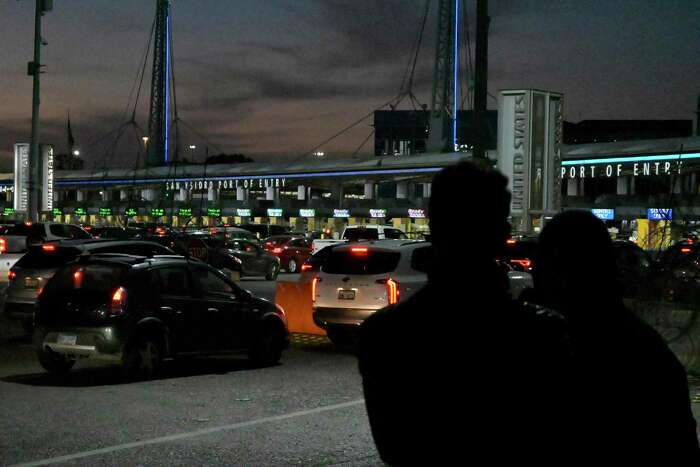A Russian couple who sought asylum at the border is in U.S. immigration custody. What does it mean for those fleeing Putin’s war?
Russian asylum seekers Anton and Julia speak with a street vendor and children from Mexico outside the San Ysidro port of entry in Tijuana on Thursday, March 17, 2022. Since U.S. Customs and Border Protection took the couple into custody on Sunday, March 20, 2022, their attorney has only been able to contact them once and does not know where they are.
Carlos Moreno/Special to The ChronicleOne week after they arrived at the Mexican border seeking political asylum in the United States, a married Russian couple are in U.S. immigration custody with little access to their family, sponsor or attorney.
Their attorney said unanswered questions about where they are and what will happen next could shed light on the next phase for Russian dissidents attempting to enter the U.S. since their government invaded Ukraine.
Julia, 26, and Anton, 27, left St. Petersburg the day Ukraine was attacked, and traveled through multiple countries before arriving March 14 at the San Ysidro port of entry in Tijuana, where they camped on a small patch of concrete at the border gate along with two dozen other Russians.
When The Chronicle met the couple on March 17, they were acting as translators for their group and had been on the Mexican side of the border gate for three days. They were hoping to reach the home of Anton’s friend in California and had declined Mexican government offers to enter shelters where other migrants denied entry to the U.S. are housed.
“The (shelter) we did visit was quite bad, to be honest,” Anton texted The Chronicle on Friday, in one of the last communications before he was detained.
Because Anton and Julia protested the regime of Russian President Vladimir Putin and fear the repercussions of being returned to Russia, The Chronicle is withholding their last name.
Anton said the Russian migrants were under pressure to leave the border gate area, and with rain in the forecast they chose to stay in a hotel on Saturday afternoon.
Around 4 a.m. Sunday, Anton texted his attorney, Margaret Cargioli of the Immigrant Defenders Law Center, that he and Julia were at the San Ysidro border gate and about to be processed into the U.S.
Cargioli began calling the San Ysidro border patrol station on Sunday morning. She told The Chronicle she was finally allowed to speak with Julia that evening, but was cut off after two minutes. Cargioli said she called back and told a supervisor that Julia had a right to speak with her attorney.
“He said that I cannot talk to her and that if every single individual there spoke to an attorney, they would never get any work done,” Cargioli said.
When border patrol authorities encounter individuals without visas attempting to enter the country, they take them into custody to determine next steps. In some cases migrants are sent back to their own countries or ones that have agreed to accept them, and some are transferred into U.S. Immigration and Customs Enforcement custody to await civil immigration hearings.
In cases where migrants have people in the U.S. willing to sponsor them during their asylum requests, border officials will sometimes release them to the sponsors without transferring them to Immigration and Customs Enforcement, or ICE.
Cargioli fears this won’t happen for Anton and Julia as some Russians in their group have told family members they are being sent to an ICE-run detention facility in Louisiana.
“It is unjust to send asylum seekers to (immigration) jails when (they) come to the United States to avail themselves of our legal system,” Cargioli said. “We do not need to force them to endure prison-like conditions during the process of their asylum case.”
Customs and Border Patrol would not confirm whether Anton and Julia are in custody.
While thousands of migrants have been prevented from making asylum claims inside the U.S. under Title 42, an obscure public health policy the Trump administration revived at the start of the pandemic, the policy was not being used to expel most Russians encountered at the southwest border before the war, government data show. Of the 7,200 Russians who arrived between October 2021 through February, only 22 were expelled under Title 42, or less than 1%.
Anton and Julia aren’t the only Russian asylum seekers that friends and families have stopped hearing from.
Mikhail, who also camped at the San Ysidro border gate with his wife Natasha, fled Russia believing he would be caught and imprisoned for ignoring an army conscription notice during the Crimea invasion in 2014. After being in regular contact with his cousin and sponsor in Cupertino, she told The Chronicle she has not heard from Mikhail in days and is worried.
On Wednesday, Cargioli said she was still not being permitted to speak to her clients, nor had she been told where they are being held. She said a border patrol officer told her Julia and Anton were most likely on their way to a detention facility in the U.S., which would put them in ICE custody. That could put them in a new, uncertain phase of their journey — no longer stuck across the border but also not free to establish new lives as their immigration cases proceed through a heavily backlogged system.
“Our real concern here is that they are not moved far away from their attorney, their families or sponsors,” Cargioli said. “And that they be allowed to speak with whomever they wish to speak with when they request as such from Customs and Border Protection.”
Deepa Fernandes is a San Francisco Chronicle staff writer. Email: deepa.fernandes@sfchronicle.com Twitter: @deepafern





No comments:
Post a Comment